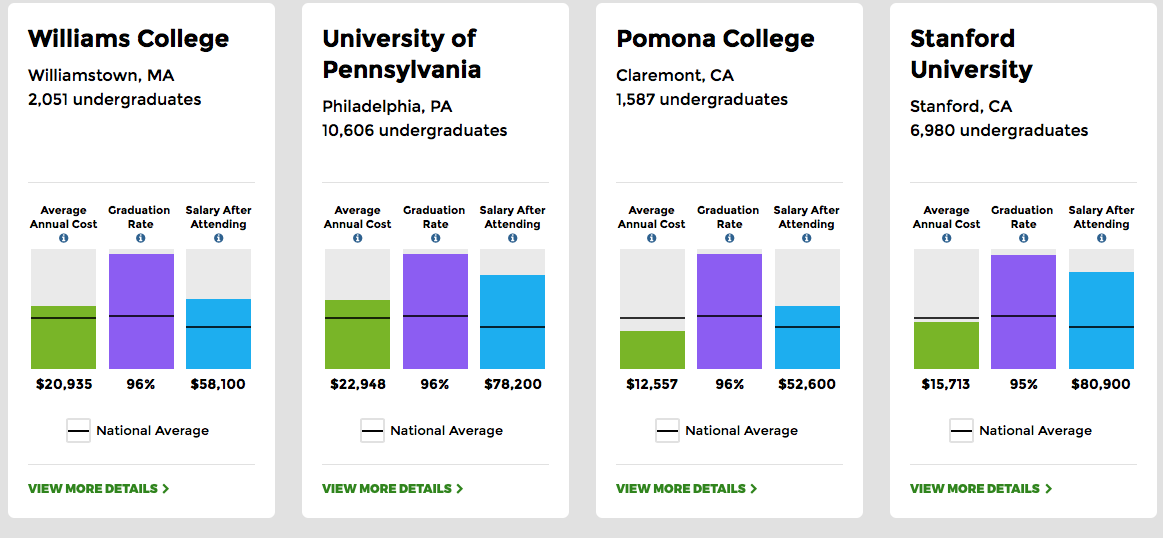With college application deadlines approaching and the recent release of Obama’s college research tool, the College Scorecard, The Paly Voice wanted to find out how useful it really is and what other tools can aid the process.
Using the College Scorecard, students can filter the search for colleges based on programs, degrees, location, size and other criteria. The Scorecard then provides a list of schools that includes both 2-year community colleges and 4-year universities.
The goal of the College Scorecard is to give college-bound seniors more information about prospective colleges.
“My administration [the Obama Administration] will release a new ‘College Scorecard’ that parents and students can use to compare schools based on a simple criteria – where you can get the most bang for your educational buck,” President Barack Obama said in his 2013 State of the Union Address.
The College Scorecard website emphasizes financial statistics for average annual cost, graduation rate and salary after attending. A user-friendly slider bar filters search results so students can determine the desired ranges for the three categories. However, though these statistics are useful, Palo Alto High School College Adviser Sandra Cernobori says most of the numbers can be found through other websites. The website does not contain data about admission statistics.
The information on Scorecard may also be potentially misleading and not representative of the Paly community, according to Cernobori.
“It [the Scorecard] reports the [predicted] salary [after graduation],” Cernobori said. “On the surface, people might think that it’s reporting across the board, but it’s only reporting for those students who received federal aid which at Paly, is a small portion of the population. … It might be a little misleading.”
In general, research is essential when applying to colleges, according to Cernobori.
“In my experience, students don’t often do as much digging into figuring out matches as I think that they should,” Cernobori said. “It’s important to play a more active role in your search, don’t let your college be an arranged marriage.”
Cernobori recommends looking at colleges holistically to find a school that fits each individual student.
“Don’t let someone else’s opinion dictate your list,” Cernobori said. “It’s fine if you want to consult rankings, but that should be one piece of information.”
According to Cernobori, students should know how college rankings are derived, the majors offered, rigor, academic versus social fit, culture of the campus, clubs, greek life and sports to better understand the schools.

The College Scorecard should be supplemented with other tools, according to Cernobori. Two research tools that Cernobori suggests to students researching colleges are The Alumni Factor and College Navigator.
“I think [they] might be a little bit more representative in terms of giving you more of an idea of what salaries graduates and alumni have,” Cernobori said.
The Alumni Factor is a website that ranks colleges based on what the graduates do after completing school. According to its website, the ranking considers the college experience, overall assessment, financial success, overall happiness and graduation rate as the components of its methodology.
The College Navigator website, a federally funded site run by the National Center for Education Statistics, is a search tool that includes a great variety of search options. Though significantly less visually appealing than the College Scorecard, Cernobori says College Navigator provides a powerful and comprehensive search.
Another tool that students have found valuable is Naviance because it contains college admissions statistics specific to Paly.
“I’ve looked at the scattergrams on Naviance,” senior Claire Dennis said. “It’s helpful to see the acceptance history since it’s Paly specific. College Prowler is also helpful since it gives you an idea of the environment [of the colleges], and you can see what appeals to you so you can make an educated decision.”
For students applying to college, Dennis advises to begin looking early.
“Start [researching] early to get an idea of what you like, and begin narrowing down your list,” Dennis said.

